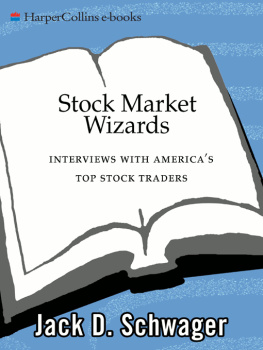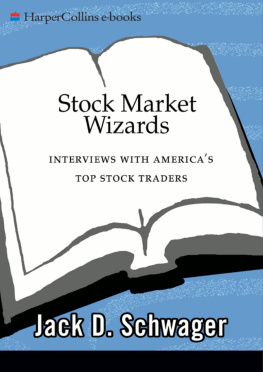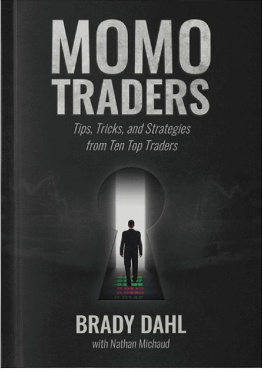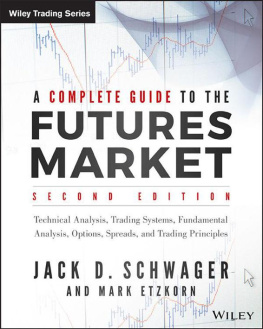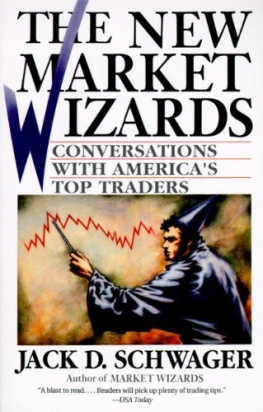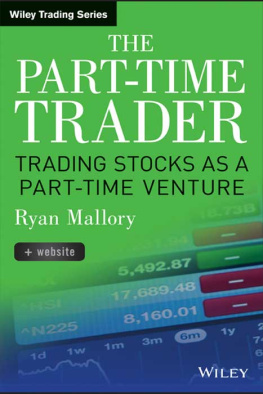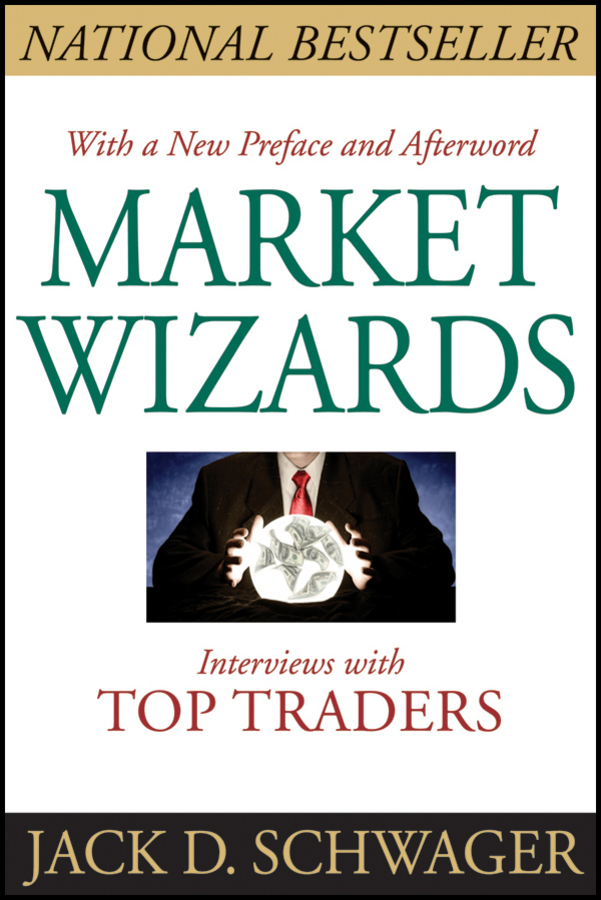Contents
Additional Praise for Market Wizards
Market Wizards is one of the most fascinating books ever written about Wall Street. A few of the Wizards are my friendsand Jack Schwager has nailed their modus operandi on the head.
Martin W. Zweig, Ph.D.,
Editor, The Zweig Forecast
It is difficult enough to develop a method that works. It then takes experience to believe what your method is telling you. But the toughest task of all is turning analysis into money. If you dont believe it, try it. These guys have it all: a method, the conviction and the discipline to act decisively time after time, regardless of distractions and pressures. They are heroes of Wall Street, and Jack Schwagers book brings their characters vividly to life.
Robert R. Prechter, Jr.,
Editor, The Elliott Wave Theorist
Other Books by Jack D. Schwager
A Complete Guide to the Futures Markets: Fundamental Analysis, Technical Analysis, Trading, Spreads, and Options
Getting Started in Technical Analysis
The New Market Wizards: Conversations with Americas Top Traders
Stock Market Wizards: Interviews with Americas Top Stock Traders
Schwager on Futures: Fundamental Analysis
Schwager on Futures: Managed Trading Myths & Truths
Schwager on Futures: Technical Analysis
Study Guide to Accompany Fundamental Analysis (with Steven C. Turner)
Study Guide to Accompany Technical Analysis (with Thomas A. Bierovic and Steven C. Turner)

Copyright 2012 by Jack D. Schwager. All rights reserved.
Published by John Wiley & Sons, Inc., Hoboken, New Jersey.
Hardcover edition published by Marketplace Books in 2006.
Published simultaneously in Canada.
No part of this publication may be reproduced, stored in a retrieval system, or transmitted in any form or by any means, electronic, mechanical, photocopying, recording, scanning, or otherwise, except as permitted under Section 107 or 108 of the 1976 United States Copyright Act, without either the prior written permission of the Publisher, or authorization through payment of the appropriate per-copy fee to the Copyright Clearance Center, Inc., 222 Rosewood Drive, Danvers, MA 01923, (978) 750-8400, fax (978) 646-8600, or on the Web at www.copyright.com . Requests to the Publisher for permission should be addressed to the Permissions Department, John Wiley & Sons, Inc., 111 River Street, Hoboken, NJ 07030, (201) 748-6011, fax (201) 748-6008, or online at http://www.wiley.com/go/permissions .
Limit of Liability/Disclaimer of Warranty: While the publisher and author have used their best efforts in preparing this book, they make no representations or warranties with respect to the accuracy or completeness of the contents of this book and specifically disclaim any implied warranties of merchantability or fitness for a particular purpose. No warranty may be created or extended by sales representatives or written sales materials. The advice and strategies contained herein may not be suitable for your situation. You should consult with a professional where appropriate. Neither the publisher nor author shall be liable for any loss of profit or any other commercial damages, including but not limited to special, incidental, consequential, or other damages.
For general information on our other products and services or for technical support, please contact our Customer Care Department within the United States at (800) 762-2974, outside the United States at (317) 572-3993 or fax (317) 572-4002.
Wiley also publishes its books in a variety of electronic formats. Some content that appears in print may not be available in electronic books. For more information about Wiley products, visit our web site at www.wiley.com .
Library of Congress Cataloging-in-Publication Data:
ISBN 978-1-118-27305-0 (paper); ISBN 978-1-118-28635-7 (ebk); ISBN 978-1-118-284926 (ebk); ISBN 978-1-118-28280-9 (ebk)
To my wife Jo Ann
and my children
Daniel, Zachary, and Samantha
for the love they give
and, more important,
the love they receive.
Youve got to learn how to fall, before you learn to fly.
Paul Simon
One mans ceiling is another mans floor.
Paul Simon
If I wanted to become a tramp, I would seek information and advice from the most successful tramp I could find. If I wanted to become a failure, I would seek advice from men who had never succeeded. If I wanted to succeed in all things, I would look around me for those who are succeeding and do as they have done.
Joseph Marshall Wade, as quoted in Treasury of Wall Street Wisdom , edited by Harry D. Schultz and Samson Coslow
Preface to the Paperback Edition
The most basic investment question is: Can the markets be beat? The efficient market hypothesis provides an unambiguous answer: No, unless you count those who are lucky.
The efficient market hypothesis, a theory explaining how market prices are determined and the implications of the process, has been the foundation of much of the academic research on markets and investing during the past half century. The theory underlies virtually every important aspect of investing, including risk measurement, portfolio optimization, index investing, and option pricing. The efficient market hypothesis can be summarized as follows:
- Prices of traded assets already reflect all known information.
- Asset prices instantly change to reflect new information.
- Therefore,
- Market prices are perfect.
- It is impossible to consistently outperform the market by using any information that the market already knows.
The efficient market hypothesis comes in three basic flavors:
Weak efficiency . This form of the efficient market hypothesis states that past market price data cannot be used to beat the market. Translation: Technical analysis is a waste of time.
Semi-strong efficiency (presumably named by a politician). This form of the efficient market hypothesis contends that you cant beat the market using any publicly available information. Translation: Fundamental analysis is also a waste of time.
Strong efficiency . This form of efficient market hypothesis argues that even private information cant be used to beat the market. Translation: The enforcement of insider trading rules is a waste of time.
Corollary: The readers of this book are delusional.
The efficient market hypothesis assumes the markets cant be beat because everyone has the same information. This reasoning is conceptually flawed. Even if everyone had all the same information, theres no reason to assume they would reach the same decision as to the appropriate price of a market or security. For example, in a chess tournament, all the players know the same rules and have access to the same chess books and records of past games by world champions, yet only a small minority excel. There is no reason to assume that all the players will use the same information with equal effectiveness. Why should the markets, which in a sense represent an even more complex game than chess (there are more variables and the rules are always changing) be any different?
In a chess tournament, a few highly skilled players will win most of the games by exploiting the mistakes of weaker players. Much like chess, it seems only reasonable to expect a few highly skilled market participants to interpret the same informationthe current position of the market chessboard, so to speakdifferently from the majority, and reach variant conclusions about the probable market direction. In this conceptual framework, mistakes by a majority of less skilled market participants can drive prices to incorrect levels (i.e., prices out of line with the unknown equilibrium level), creating opportunities for more skilled traders.


